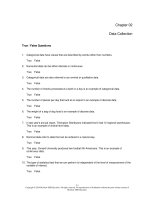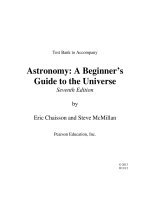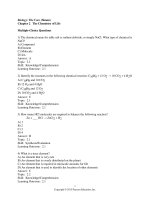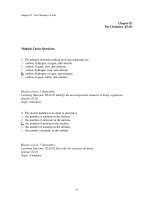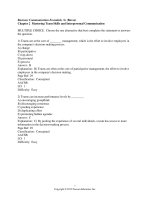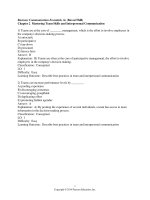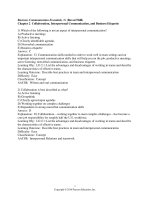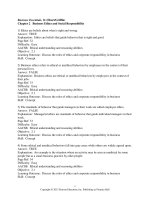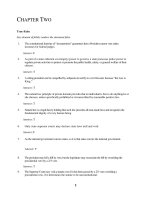CDN ED sociology in our times the essentials 5th edition murray test bank
Bạn đang xem bản rút gọn của tài liệu. Xem và tải ngay bản đầy đủ của tài liệu tại đây (363.84 KB, 27 trang )
Chapter 2-Culture and Society in a Changing World
MULTIPLE CHOICE
1.
Which of the following do sociologists refer to as “the knowledge, language, values, customs, and
material objects that are passed from person to person and from one generation to the next in a human
group or society”?
a. culture
b. society
c. social organization
d. religion
ANS: A
PTS: 1
REF: page 32
BLM: Remember
2.
Three sociologists are discussing the relationship between society and culture. Which of the following
are they likely to conclude about this relationship?
a. Culture and society are both composed of people.
b. Culture, unlike society, seldom generates discord, conflict, or violence.
c. Culture and society are interdependent.
d. Culture can exist without society.
ANS: C
PTS: 1
REF: page 32
BLM: Higher Order
3.
Behavioural responses that satisfy needs such as sleep, food, water, or sexual gratification are
examples of which of the following?
a. instincts
b. reflexes
c. drives
d. learned behaviours
ANS: C
PTS: 1
REF: page 33
BLM: Remember
1
4.
You have been asked to give a brief presentation to your Introduction to Sociology class on the
acquisition of human culture. Which of the following will most likely be the basic message of your
presentation?
a. We learn about culture through interaction, observation, and imitation in order to
participate as members of a group.
b. We are born with a shared sense of who we are and where we belong.
c. Rules about civility, tolerance, and how to communicate with one another are reflexes,
drives, and instincts that humans share.
d. Culture comes from the toolkit given to us by nature.
ANS: A
PTS: 1
REF: page 32-33
BLM: Higher Order
5.
Which of the following does sociologist Ann Swidler, describe as a “tool kit of symbols, stories,
rituals, and world views, which people may use in varying configurations to solve different kinds of
problems”?
a. culture
b. society
c. instincts
d. reflexes
ANS: A
PTS: 1
REF: page 33
BLM: Remember
6.
By doing which of the following would you be participating in material culture?
a. attending a religious service
b. driving on a highway
c. going to the theatre
d. studying a new language
ANS: B
PTS: 1
REF: page 33
BLM: Higher Order
7.
Which of the following terms would a sociologist use to collectively describe grain elevators, banking
pin chips, and training in Cardio Pulmonary Resuscitation?
a. industrialization
b. technology
c. material culture
d. nonmaterial culture
ANS: B
PTS: 1
REF: page 33-34
BLM: Higher Order
2
8.
Which of the following is an example of nonmaterial culture?
a. an act of kindness
b. a train
c. a flash drive
d. a house
ANS: A
PTS: 1
REF: page 34
BLM: Higher Order
9.
Gillian argues that there is one all-powerful god. Which of the following aspects of culture best
exemplifies Gillian’s argument?
a. norm
b. value
c. belief
d. law
ANS: C
PTS: 1
REF: page 34
BLM: Higher Order
10.
Which of the following terms refers to customs and practices that occur across all societies?
a. symbols
b. beliefs
c. norms
d. cultural universals
ANS: D
PTS: 1
REF: page 34
BLM: Remember
11.
Which of the following statements regarding cultural universals is NOT true?
a. Cultural universals include appearance, activities, institutions, and customary practices.
b. The specific form of cultural universals is constant from one time to another within the
same group.
c. The specific form of cultural universals is constant from one group to another. .
d. Sociologists are in agreement that cultural universals are the result of functional necessity.
ANS: A
PTS: 1
REF: page 34-36
BLM: Remember
3
12.
Five interconnected rings appear as an emblem on Olympic promotional material. Which choice below
best represents how a sociologist would refer to the rings?
a. as a symbol
b. as a social fact
c. as a cultural referents
d. as a custom
ANS: A
PTS: 1
REF: page 36
BLM: Higher Order
13.
Your best friend ends every e-mail to you with the signature :)>+. Which of the following terms best
describes her signature?
a. an emotion
b. an emoticon
c. a semicon
d. a sentiment
ANS: B
PTS: 1
REF: page 36
BLM: Higher Order
14.
Which of the following is the term for the set of symbols that expresses ideas and enables people to
think and communicate with one another?
a. knowledge
b. social reality
c. language
d. culture
ANS: C
PTS: 1
REF: page 37
BLM: Remember
15.
According to the chapter on culture in the text, which of the following is one of our most important
human attributes?
a. knowledge
b. norms
c. language
d. culture
ANS: C
PTS: 1
REF: page 37
BLM: Remember
4
16.
Which of the following statements regarding language is accurate according to the text?
a. Nonhuman animals are easily able to transmit complex aspects of culture to their
offspring.
b. Higher apes can manipulate symbols to express abstract s and rules, thereby transmitting
culture from one generation to the next.
c. Language is solely a human characteristic.
d. Chimpanzees can use elements of Standard American Sign Language and manipulate
physical objects to make “sentences.”
ANS: D
PTS: 1
REF: page 37
BLM: Remember
17.
What does the Sapir-Whorf hypothesis argue?
a. Language imprisons people.
b. Language is common to both animals and humans.
c. Language shapes how its speakers view reality.
d. Language is less important than symbols in determining how we view the world.
ANS: C
PTS: 1
REF: page 37
BLM: Higher Order
18.
Which of the follow assumptions about language does the Sapir-Whorf hypothesis make?
a. Thought and language exist independent of one another.
b. People have thoughts then they express them through language.
c. Language comes before thought.
d. People perceive reality then use language to explain it.
ANS: C
PTS: 1
REF: page 37
BLM: Higher Order
19.
Which of the following is one significant difference between English and many Aboriginal languages?
a. There are many more nouns that have gender in Aboriginal languages.
b. English divides nouns into the animate and inanimate.
c. Many Aboriginal languages have several different pronouns meaning he or she.
d. Many Aboriginal languages are not preoccupied with gender.
ANS: D
PTS: 1
REF: page 37
BLM: Remember
5
20.
According to the text, which of the following is accurate about Aboriginal languages in Canada?
a. They are highly “gendered” (e.g. structured around gender).
b. Historically, they were transmitted through complex carved symbols.
c. They focus on relationships between people and things.
d. They focus on evaluating people and situations.
ANS: C
PTS: 1
REF: page 37
BLM: Higher Order
21.
One of Maya’s professors constantly uses the term mankind in place of the term humanity. Maya finds
this annoying. Why does this annoy her?
a. It masks the relationship between language and gender.
b. Using the masculine form ignores and invisibilizes women.
c. It standardizes language and makes it more objective.
d. Because humanity is a gender exclusive term.
ANS: B
PTS: 1
REF: page 38
BLM: Higher Order
22.
Which of the following terms represents a language-based predisposition to think about women in
sexual terms?
a. female
b. babe
c. woman
d. she
ANS: B
PTS: 1
REF: page 38
BLM: Higher Order
23.
Which of the following is the best example of a gender-neutral term?
a. maid
b. actress
c. councilman
d. flight attendant
ANS: D
PTS: 1
REF: page 38
BLM: Higher Order
6
24.
Which of the following is an example of the way language may create and reinforce negative
perceptions about race and ethnicity?
a. counter-representations that portray positive images of certain ethnic groups
b. overtly derogatory terms popularized in movies, music, and other forms of popular culture
c. the “voice” of verbs that overemphasize the importance of the activities and achievements
of members of minority groups
d. the “voice” of verbs that underemphasize the importance of the activities and
achievements of members of majority groups
ANS: B
PTS: 1
REF: page 38
BLM: Remember
25.
What year did Canada pass the Official Languages Act, thus adopting both English and French as
official languages?
a. 1969
b. 1975
c. 1988
d. 1992
ANS: A
PTS: 1
REF: page 39
BLM: Remember
26.
According to the 2006 census, which of the following represents the percentage of Canadians who are
bilingual?
a. under 5 percent
b. approximately 10 percent
c. 15–20 percent
d. over 30 percent
ANS: C
PTS: 1
REF: page 39
BLM: Remember
27.
According to the 2006 census, which of the following percentage ranges of Aboriginal persons
reported an Aboriginal language as their first language?
a. 5–10 percent
b. 11–19 percent
c. 20–30 percent
d. over 30 percent
ANS: A
PTS: 1
REF: page 39
BLM: Remember
7
28.
Which of the following is the term for a particular culture’s collective ideas about right and wrong,
good and bad, and desirable and undesirable?
a. norms
b. beliefs
c. values
d. assumptions
ANS: C
PTS: 1
REF: page 39
BLM: Remember
29.
According to the text, which of the following is a core Canadian value?
a. morality and humanitarianism
b. pay equity and employment equity
c. honesty and justice
d. kindness and love
ANS: A
PTS: 1
REF: page 39
BLM: Remember
30.
A local human rights organization has started a group at your campus. Recruitment coincides with
final exams. Which of the following might students who are both academically driven and
humanitarian minded experience?
a. conflicted mores
b. value contradictions
c. real culture
d. informal norms
ANS: B
PTS: 1
REF: page 39
BLM: Higher Order
31.
Canadians may believe that they are law abiding, but will routinely fail to wear a seat belt or slow
down in school zones. What does this demonstrate?
a. a discrepancy between ideal culture and real culture
b. the difference between Canadians and Americans
c. the differences between a law and a more
d. a discrepancy between cultural universals and value contradictions
ANS: A
PTS: 1
REF: page 39
BLM: Higher Order
8
32.
The degree of discrepancy between ideal and real culture is relevant to sociologists who are
investigating social change. Large discrepancies provide a foothold for demonstrating that people often
pretend to be what they are not, or to feel what they do not feel. Which of the following terms does the
text use to refer to this tendency?
a. hypocrisy
b. insincerity
c. lying
d. sanctimoniousness
ANS: A
PTS: 1
REF: page 39
BLM: Higher Order
33.
Which of the following is the best example of a proscriptive norm?
a. standing during the national anthem
b. giving up your seat on a bus to a pregnant woman
c. wearing clothing
d. texting in class during a lecture
ANS: D
PTS: 1
REF: page 40
BLM: Higher Order
34.
The text discusses a variety of criteria for norms of different types. Which of the following statements
regarding norms is accurate according to the text?
a. All norms are of equal importance.
b. Mores are the least important type of norm.
c. Norms have specific behavioural expectations.
d. Taboos are a more serious type of folkway.
ANS: D
PTS: 1
REF: page 40
BLM: Remember
35.
Suppose a woman is named “Citizen of the Year” in her home community. Which of the following
does this demonstrate?
a. a folkway
b. a positive sanction
c. a negative sanction
d. a more
ANS: B
PTS: 1
REF: page 40
BLM: Higher Order
9
36.
Suppose that during a movie, a man begins to talk to the woman sitting next to him in an audible tone
of voice. A man in another row turns around, frowns at the man who is talking, and says “Keep it
down.” Which of the following does this illustrate?
a. an informal sanction
b. a formal sanction
c. a taboo
d. a core value
ANS: A
PTS: 1
REF: page 40
BLM: Higher Order
37.
Which of the following are informal norms or everyday customs that may be violated without serious
consequences within a particular culture?
a. informal sanctions
b. taboos
c. folkways
d. negative sanctions
ANS: C
PTS: 1
REF: page 40
BLM: Remember
38.
Every day when you get up out of bed, you brush your teeth, apply underarm deodorant, then select
and put on appropriate clothing. Which of the following are all of these actions examples of?
a. formal norms
b. folkways
c. mores
d. laws
ANS: B
PTS: 1
REF: page 40
BLM: Higher Order
39.
Which of the following is the most likely reaction when a person violates a folkway?
a. an informal sanction
b. a formal sanction
c. a positive sanction
d. a prescriptive norm
ANS: A
PTS: 1
REF: page 40
BLM: Higher Order
10
40.
Which of the following best explains why those who break mores are more severely sanctioned than
those who break folkways?
a. because informal norms may not be violated without serious consequences
b. because breaking a more is universally offensive
c. because mores are based on cultural values and considered crucial for the well-being of
the group
d. because all mores are considered taboos and subject to severe sanctions
ANS: C
PTS: 1
REF: page 40
BLM: Higher Order
41.
Which of the following terms would a sociologist use to refer to specific behavioural expectations of
any society?
a. prescriptions
b. values
c. codes of conduct
d. norms
ANS: D
PTS: 1
REF: page 40
BLM: Remember
42.
According to the text, which of the following statements best describes mores?
a. informal norms that may be violated without serious consequences
b. norms that are not considered to be highly essential to the stability of society
c. norms based on cultural values and considered crucial for the well-being of the group
d. learned patterns of behaviour that can vary markedly from one society to another
ANS: C
PTS: 1
REF: page 40
BLM: Remember
43.
Which of the following statements regarding folkways and mores is accurate according to the text?
a. Folkways and mores are punishments for inappropriate or callous behaviour.
b. Folkways and mores are rewards for appropriate behaviour.
c. Folkways and mores make everyday life more predictable.
d. Folkways and mores provide guidelines for ethical treatment.
ANS: B
PTS: 1
REF: page 40
BLM: Remember
11
44.
Which of the following do sociologists call mores that are so strong that their violation is considered to
be extremely offensive and even unmentionable?
a. laws
b. taboos
c. negative sanctions
d. formal sanctions
ANS: B
PTS: 1
REF: page 40
BLM: Remember
45.
Which of the following is the best example of a taboo in Canadian society?
a. picking your nose in public
b. having sexual relations with someone from within your own family
c. driving at the speed limit
d. dating an individual from another ethnic background
ANS: B
PTS: 1
REF: page 40
BLM: Higher Order
46.
Which of the following is a taboo found in virtually every society?
a. public urination
b. incest
c. nudity
d. premarital sex
ANS: B
PTS: 1
REF: page 40
BLM: Higher Order
47.
Which of the following are formal, standardized norms that have been enacted by legislatures and are
enforced by formal sanctions?
a. folkways
b. mores
c. laws
d. legislative mandates
ANS: C
PTS: 1
REF: page 40
BLM: Remember
12
48.
Which one of the following kinds of law deals with disputes between persons or groups?
a. civil
b. criminal
c. informal
d. formal
ANS: A
PTS: 1
REF: page 40
BLM: Remember
49.
According to the text, which of the following kinds of norm formally deals with public safety and
well-being?
a. civil law
b. folkways
c. mores
d. criminal law
ANS: D
PTS: 1
REF: page 40
BLM: Remember
50.
Which of the following is the term for a new form of online popular culture that is especially embraced
by teenagers?
a. netlinx
b. cyberculture
c. webcult
d. network society
ANS: B
PTS: 1
REF: page 41
BLM: Remember
51.
Which of the following is based on the assumption that one’s own culture and way of life are superior
to all others?
a. group superiority
b. ethnocentrism
c. the authoritarian personality
d. self-centredness
ANS: B
PTS: 1
REF: page 42
BLM: Remember
13
52.
If you overhear someone using derogatory stereotypes to ridicule a recent immigrant who stands out in
appearance, which of the following are you witnessing?
a. positive ethnocentrism
b. negative ethnocentrism
c. positive cultural relativism
d. negative cultural relativism
ANS: B
PTS: 1
REF: page 42
BLM: Higher Order
53.
A team song or camp chant taught to children are both forms of which of the following?
a. positive ethnocentrism
b. negative ethnocentrism
c. positive cultural relativism
d. high culture
ANS: A
PTS: 1
REF: page 42
BLM: Higher Order
54.
Which of the following is the belief that the behaviours and customs of any culture must be viewed
and analyzed by the culture’s own standards?
a. cultural xenocentrism
b. diversity in practice
c. cultural relativism
d. reverse ethnocentrism
ANS: C
PTS: 1
REF: page 42
BLM: Remember
55.
Which of the following does anthropologist Marvin Harris use to explain why cattle, which are viewed
as sacred in India, are not killed and eaten although India has widespread hunger and malnutrition?
a. cultural xenocentrism
b. diversity in practice
c. cultural relativism
d. reverse ethnocentrism
ANS: C
PTS: 1
REF: page 42
BLM: Remember
14
56.
Some Westerners assume that hunger and poverty in India is caused by cow worship, and would be
eliminated if Indians would adopt their practices of slaughtering cattle for food. Which of the
following would anthropologist Marvin Harris likely say about such a conclusion?
a. It demonstrates cultural relativism.
b. It is ethnocentric.
c. It shows that we fully understand and accept cultural diversity.
d. It indicates that Canadians are xenophobic.
ANS: B
PTS: 1
REF: page 42
BLM: Higher Order
57.
With regard to the discussion of cultural change in the text, which of the following is the Apple iPad
an example of?
a. Cultures tend to remain fairly static.
b. Societies experience cultural change at material levels but remain fairly static at
nonmaterial levels.
c. Most technological changes are modifications of existing technology.
d. The pace of technological change has decreased significantly in recent years.
ANS: C
PTS: 1
REF: page 42
BLM: Higher Order
58.
Who coined the term cultural lag?
a. Emile Durkheim
b. Max Weber
c. William F. Ogburn
d. Karl Marx
ANS: C
PTS: 1
REF: page 42
BLM: Remember
59.
Which of the following is the term for the gap between the technical development of a society and its
moral and legal institutions?
a. cultural diffusion
b. cultural relativity
c. cultural innovation
d. cultural lag
ANS: D
PTS: 1
REF: page 42
BLM: Remember
15
60.
Which of the following is the term that is used to describe the situation where material culture changes
faster than nonmaterial culture?
a. diffusion
b. relativity
c. innovation
d. lag
ANS: D
PTS: 1
REF: page 42
BLM: Remember
61.
At the material cultural level, the personal computer and electronic coding have made it possible to
create a unique health identifier for each person in Canada. Based on the available technology, it
would be possible to create a national data bank that includes everyone’s medical records from birth to
death. However, the availability does not mean it will be accepted by people who believe the data bank
would constitute and invasion of privacy. Which of the following is the term for this discrepancy?
a. cultural diffusion
b. cultural transmission
c. cultural lag
d. cultural relativity
ANS: C
PTS: 1
REF: page 42-43
BLM: Higher Order
62.
Which of the following defines the process of learning about something previously unknown or
unrecognized?
a. invention
b. diffusion
c. discovery
d. cultural advancement
ANS: C
PTS: 1
REF: page 43
BLM: Remember
63.
Historically, which of the following involved unearthing natural elements or existing realities
including fire or the true shape of the earth?
a. invention
b. diffusion
c. discovery
d. cultural advancement
ANS: C
PTS: 1
REF: page 43
BLM: Remember
16
64.
When existing cultural elements are reshaped into a new form, which of the following processes has
occurred?
a. cultural lag
b. an invention
c. a discovery
d. cultural diffusion
ANS: B
PTS: 1
REF: page 43
BLM: Remember
65.
Which of the following is the term used for the transmission of cultural items or social practices from
one group or society to another?
a. discovery
b. diffusion
c. functional reorganization
d. rediscovery
ANS: B
PTS: 1
REF: page 43
BLM: Remember
66.
Which of the following cultural processes is assisted by exploration, the media, and tourism?
a. discovery
b. diffusion
c. functional reorganization
d. rediscovery
ANS: B
PTS: 1
REF: page 43
BLM: Higher Order
67.
Which of the following is the popularity of Chinese food in Canada an example of?
a. cross-cultural advertising
b. cultural lag
c. cultural diffusion
d. cultural diversity
ANS: C
PTS: 1
REF: page 43
BLM: Higher Order
17
68.
Which of the following can North American society be described as?
a. homogeneous
b. heterogeneous
c. culturally advanced
d. immigrant threatened
ANS: B
PTS: 1
REF: page 43
BLM: Higher Order
69.
Which of the following is the term used by sociologists for a group of people who share a distinctive
set of cultural beliefs and behaviours that differ in some significant way from that of the larger
society?
a. a subculture
b. a counterculture
c. a contraculture
d. an ethnic neighbourhood
ANS: A
PTS: 1
REF: page 45
BLM: Remember
70.
According to the text, which of the following is accurate regarding the Hutterites of Western Canada?
a. They believe that communal living is necessary.
b. They attempt to achieve complete isolation from the wider society.
c. They refuse to use any sort of modern machinery or equipment.
d. They are a good example of a counterculture.
ANS: A
PTS: 1
REF: page 45–46
BLM: Higher Order
71.
Which of the following terms is used for groups that strongly reject the dominant societal values and
norms and seek alternative lifestyles?
a. subcultures
b. countercultures
c. contracultures
d. infracultures
ANS: B
PTS: 1
REF: page 47
BLM: Remember
18
72.
Which of the following is an example of a counterculture?
a. Hutterites
b. flower children in the 1960s
c. 1990s rave drug enthusiasts
d. Italian Canadians
ANS: B
PTS: 1
REF: page 47
BLM: Remember
73.
Which of the following explains why “skinheads” might be considered a counterculture?
a. There are fewer of them relative to other groups in the mainstream society.
b. They hold views that contradict the norms and values of mainstream Canadian culture.
c. They dress in a clearly identifiable manner.
d. They tend to live on the fringe of society.
ANS: B
PTS: 1
REF: page 47
BLM: Higher Order
74.
Which of the following is the disorientation that people feel when they encounter cultures radically
different from their own?
a. culture shock
b. societal disbelief
c. national anomie
d. subcultural shame
ANS: A
PTS: 1
REF: page 47BLM: Remember
75.
Suppose a person enters a new society and is taken aback at the customary appearance of the people,
the customs and the social environment. Which of the following is this person experiencing?
a. societal disbelief
b. cultural shock
c. subcultural shame
d. national anomie
ANS: B
PTS: 1
REF: page 47
BLM: Higher Order
19
76.
According to anthropologist Bronislaw Malinowski, which of the following is a need that culture is not
able to help people meet?
a. economic
b. biological
c. instrumental
d. integrative
ANS: A
PTS: 1
REF: page 47
BLM: Remember
77.
Which of the following types of needs are religion and art examples of, according to anthropologist
Bronislaw Malinowski?
a. economic
b. educational
c. instrumental
d. integrative
ANS: D
PTS: 1
REF: page 47
BLM: Remember
78.
Which of the following is a functionalist likely to argue about culture?
a. Societies that share a common language and core values are unlikely to have dysfunctions.
b. Societies in which people share a common language and core values are more likely to
have consensus and harmony.
c. A group’s values, norms, and taboos are biologically transmitted from one generation to
another.
d. Values and norms help create and sustain the privileged position of the powerful in society
while excluding others.
ANS: B
PTS: 1
REF: page 47
BLM: Higher Order
79.
Which of the following has the functionalist perspective on culture been criticized for?
a. focusing on how societies meet their needs
b. not acknowledging factors that lead to conflict and strife in society
c. downplaying the role of stability and cooperation
d. overemphasizing a microlevel analysis of society
ANS: B
PTS: 1
REF: page 47
BLM: Remember
20
80.
Which of the following statements would a conflict theorist agree with?
a. Popular culture may be the “glue” that holds society together.
b. Popular culture is produced by corporations like any other product or service is.
c. Popular culture may be dysfunctional if it undermines core cultural values.
d. Popular culture may help us temporarily forget the problems we face in everyday life.
ANS: B
PTS: 1
REF: page 48
BLM: Higher Order
81.
Which of the following is one limitation of the conflict perspective on culture?
a. it focuses on conflict and divisiveness, while ignoring the role of harmony and stability
b. it stresses how cultural values and norms may perpetuate inequality
c. it focuses on the tension between those who want change and those who do not want
change
d. it highlights the inevitability of change
ANS: A
PTS: 1
REF: page 48
BLM: Remember
82.
Using the symbolic interactionist perspective according to Simmel, which of the following would he
say about money?
a. Money becomes a means to an end.
b. We are aware of worth based on objective, economic calculations.
c. Intrinsic qualities of sports figures or wealthy entrepreneurs matter more than how much
money they make in our assessment of their worth.
d. People create money as a means of exchange but then it acquires a social meaning that
extends beyond the economic function.
ANS: D
PTS: 1
REF: page 49
BLM: Higher Order
83.
Which of the following statements would a postmodernist say is inaccurate?
a. Culture helps meet biological, instrumental, and expressive needs.
b. Much of what has been written about culture in the western world is Eurocentric.
c. The world of culture today is based on simulation, not reality.
d. No single perspective can grasp the complexity and diversity of the social world.
ANS: A
PTS: 1
REF: page 49
BLM: Higher Order
21
84.
Which statement below matches the perspective on culture with the correct theory?
a. Functionalists examine the intertwining relationship among race, gender, and popular
culture.
b. Conflict theorists highlight how people maintain and change culture through their
interactions with others.
c. Postmodernists demonstrate “reality” is not what it seems and speak of cultures, rather
than culture.
d. Interactionists help us see how popular culture promotes consumption of commodities.
ANS: C
PTS: 1
REF: page 47-49
BLM: Higher Order
Scenario 1
Instructions: Read the following scenario and answer the questions that follow.
Friends Sarah and Josh are sitting at a table for six at the cafeteria around lunch time. Neither of them
has anything to eat or drink at the table. The cafeteria begins to fill up and get extremely noisy and
busy. Josh sits reading his sociology textbook, cramming for his upcoming midterm, while Sarah texts
her mother about where they will meet after school so Sarah can get a ride home. Sarah ends her text
to her mother with a “”. Shortly, they are asked by a student they do not know if he may join their
table to eat his lunch. They both nod and make room for him and his lunch tray at the table but neither
speaks to him. A few minutes later, another student walks over to the table, ignores the student eating
his lunch, pointedly looks from Sarah and Josh to the table empty of food or drinks, glares at them
both, and then stalks away, clearly upset.
85.
Which of the following is the “” that Sarah texted to her mother?
a. technological change
b. an informal norm
c. diffusion
d. a symbol
ANS: D
PTS: 1
REF: page 37
BLM: Higher Order
86.
Which of the following behaviours are Sarah and Josh exhibiting by sitting at the table at lunch time
and not eating?
a. following cultural privacy norms
b. challenging a taboo
c. breaking a folkway
d. undermining hypocrisy
ANS: C
PTS: 1
REF: page 40
BLM: Higher Order
22
87.
Which of the following does the glare given by the fourth student to Sarah and Josh represent?
a. a value contradiction
b. a negative sanction
c. the difference between real and ideal culture
d. a more
ANS: B
PTS: 1
REF: page 40
BLM: Higher Order
TRUE/FALSE
1.
A society includes the knowledge, language, values, customs, and material objects that are passed
from person to person and from one generation to the next.
ANS: F
PTS: 1
REF: page 32
2.
Most sociologists agree that human beings have instincts.
ANS: F
PTS: 1
REF: page 33
3.
Cultural universals are useful because they ensure the smooth and continuous operation of society.
ANS: T
PTS: 1
REF: page 35
4.
Regardless of the perspective used to approach the issues involved, cultural universals are always the
result of functional necessities.
ANS: F
PTS: 1
REF: page 35–36
5.
Culture could not exist without symbols because there would be no shared meanings among people.
ANS: T
PTS: 1
REF: page 36
6.
Symbols can affect our thoughts about social class.
ANS: T
PTS: 1
REF: page 36
23
7.
Language is solely a human characteristic.
ANS: F
PTS: 1
REF: page 37
8.
Many Aboriginal languages do not have personal pronouns based on gender.
ANS: T
PTS: 1
REF: page 37
9.
Values dictate which behaviours are appropriate and which are not in a given culture.
ANS: F
PTS: 1
REF: page 39
10.
Canada is one of the few societies that has no identifiable value contradictions.
ANS: F
PTS: 1
REF: page 39
11.
Proscriptive norms state what behaviours are appropriate and acceptable.
ANS: F
PTS: 1
REF: page 40
12.
Praise, honours, or medals for conformity to specific norms are all examples of positive sanctions.
ANS: T
PTS: 1
REF: page 40
13.
Negative sanctions are always formal; that is, they relate only to law.
ANS: F
PTS: 1
REF: page 40
14.
Ethnocentrism is based on the assumption that one’s own way of life if superior to all others.
ANS: T
PTS: 1
REF: page 42
24
15.
The downside of cultural relativism is that it may be used to excuse customs and behaviour that violate
basic human rights.
ANS: T
PTS: 1
REF: page 42
16.
Cultures generally remain static.
ANS: F
PTS: 1
REF: pages 42-43
17.
Material culture tends to change faster than nonmaterial culture.
ANS: T
PTS: 1
REF: page 42
18.
Today, discovery most often results from scientific research.
ANS: T
PTS: 1
REF: page 43
19.
The widespread infusion of the English language into countries that speak other languages can be
viewed as a form of cultural imperialism.
ANS: T
PTS: 1
REF: page 43
20.
A key tenet of Hutterite faith is non-assimilation.
ANS: T
PTS: 1
REF: page 46-47
21.
According to the functionalist perspective, stability is essential for the continued survival of society.
ANS: T
PTS: 1
REF: page 47
22.
According to Karl Marx, ideology is a tool used by the elite to maintain their position of dominance in
society.
ANS: T
PTS: 1
REF: page 48
25
